
Project Management
Feb 17, 2026
By
Avaran
Top Project Management Software with Invoicing: The Complete 2026 Guide
If you're still toggling between a spreadsheet, a billing tool, and your email to keep projects on track, you already know how fast things fall through the cracks. Project management software with an invoicing feature fixes time, tasks, and billing in one place.
This guide walks you through what these project management tools do, who they work best for, and how to choose the right one in 2026.
What is Project Management Software with Invoicing?
Project management software with invoicing combines two tools that most businesses treat as separate: a platform for planning and executing work and a system for billing clients. When they share the same database, time logged on a task flows directly into an invoice draft. Expenses added to a project appear on the client statement automatically. Nothing gets lost in translation between apps.
This is sometimes called project management and billing software, or invoice software for task management. The labels vary, but the core idea is the same: one platform handles the full cycle from kickoff to payment.
Why Combining Project Management and Invoicing Matters in 2026
Businesses that rely on two or three disconnected tools for project delivery and billing often deal with the same problems: duplicated data entry, invoices that go out late, and disputes over billable hours. As client expectations around transparency have grown, these friction points are harder to absorb.
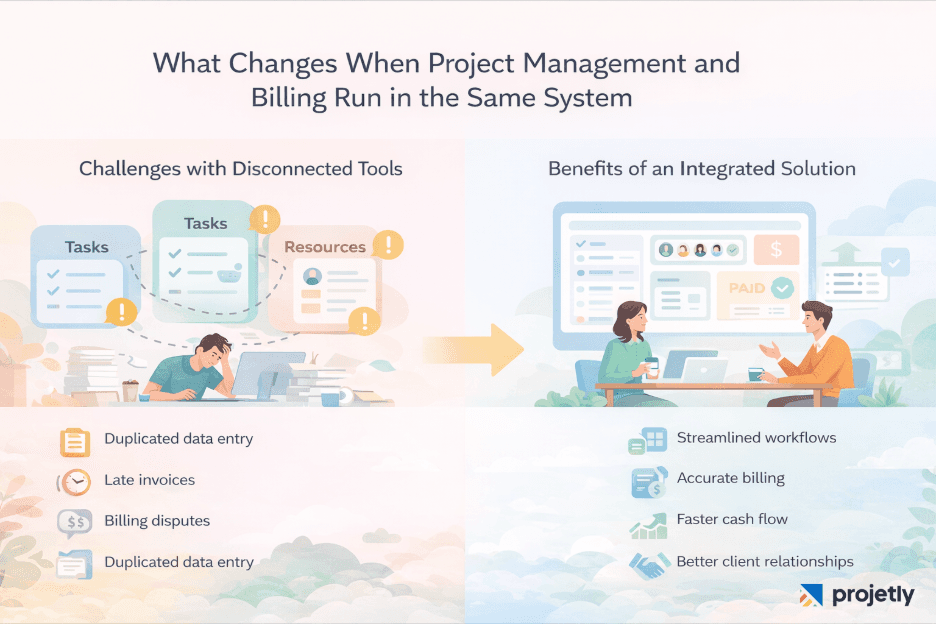
Here is what changes when project management and billing software run in the same system:
Streamlined workflow: Teams stop switching between apps. Tasks, deadlines, resources, and invoices all live in one view.
Accurate billing: Time tracked against a task feeds the invoice automatically, reducing the chance of under- or overbilling.
Faster cash flow: Invoices go out when work is complete, not when someone gets around to building them in a separate tool.
Better client relationships: Clients see accurate, itemized invoices that tie directly to the work delivered, which builds trust.
Centralized data: All project and financial records sit in one place, making reporting and decision-making faster.
Related blog: 7 Expert Tips For Creating A Flawless Implementation Project Plan
Top Project Management Software with Invoicing Features in 2026
The market has expanded significantly. Below are ten tools worth serious consideration, ranging from lightweight options for freelancers to enterprise-grade platforms for service firms.
1. Projetly
Projetly is built on the idea that project delivery and billing should function as one continuous workflow rather than separate systems. It connects execution, collaboration, and financial outcomes in a single platform so teams can manage work and revenue together.
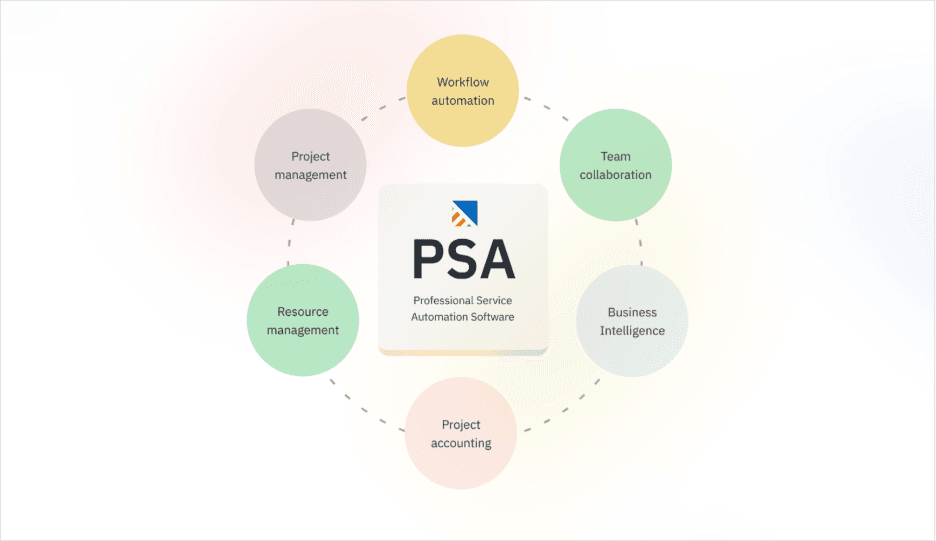
Core Capabilities
Integrated Project Management: Plan projects, assign tasks, track milestones, and monitor progress in real time from one dashboard, ensuring full visibility into timelines, workloads, and delivery status.
Built-in Time Tracking and Automated Invoicing: Time logged against tasks flows directly into invoices, reducing manual entry, preventing revenue leakage, and speeding up billing cycles.
Resource and Capacity Planning: View team availability, allocate work efficiently, and avoid bottlenecks or under-utilization through structured workload management.
Client Collaboration and Transparency: Shared portals, document access, and centralized communication keep clients informed while maintaining a professional, organized delivery experience.
Automation for Operational Efficiency: Automated task assignments, reminders, approvals, and status updates reduce administrative work and keep projects moving consistently.
Financial Visibility and Performance Insights: Dashboards surface profitability, utilization rates, delivery trends, and project risks, helping teams make informed operational decisions.
Accounting Integrations: Connections with systems like QuickBooks and Xero ensure invoices and financial data sync smoothly with existing accounting workflows.
Key Benefits
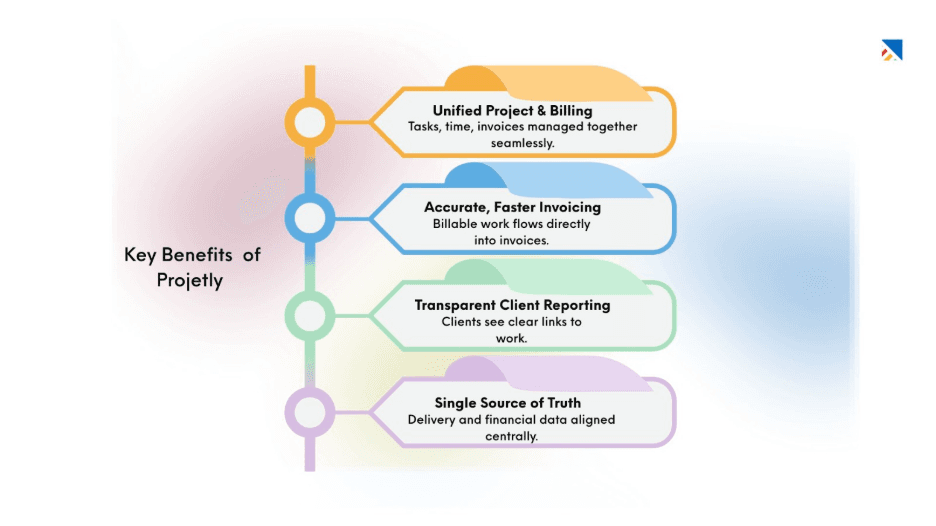
Eliminates switching between project and billing tools: Tasks, time tracking, and invoicing live in one system, reducing manual data transfer. Teams spend less time on admin work and more time delivering projects.
Improves invoice accuracy and cash-flow timing: Billable time flows directly from tasks into invoices, reducing errors and missed charges. Invoices go out faster, helping stabilize and accelerate revenue.
Strengthens client trust through transparent reporting: Clear, itemized invoices linked to real work completed improve visibility. Clients understand what they’re paying for, reducing disputes and follow-ups.
Provides a single source of truth for delivery and financial data: Project status, utilization, budgets, and revenue metrics stay aligned in one place. This improves reporting accuracy and supports smarter operational decisions.
Want to see how Projetly can streamline your project management and invoicing?
Book a personalized call today.
2. Zoho Projects
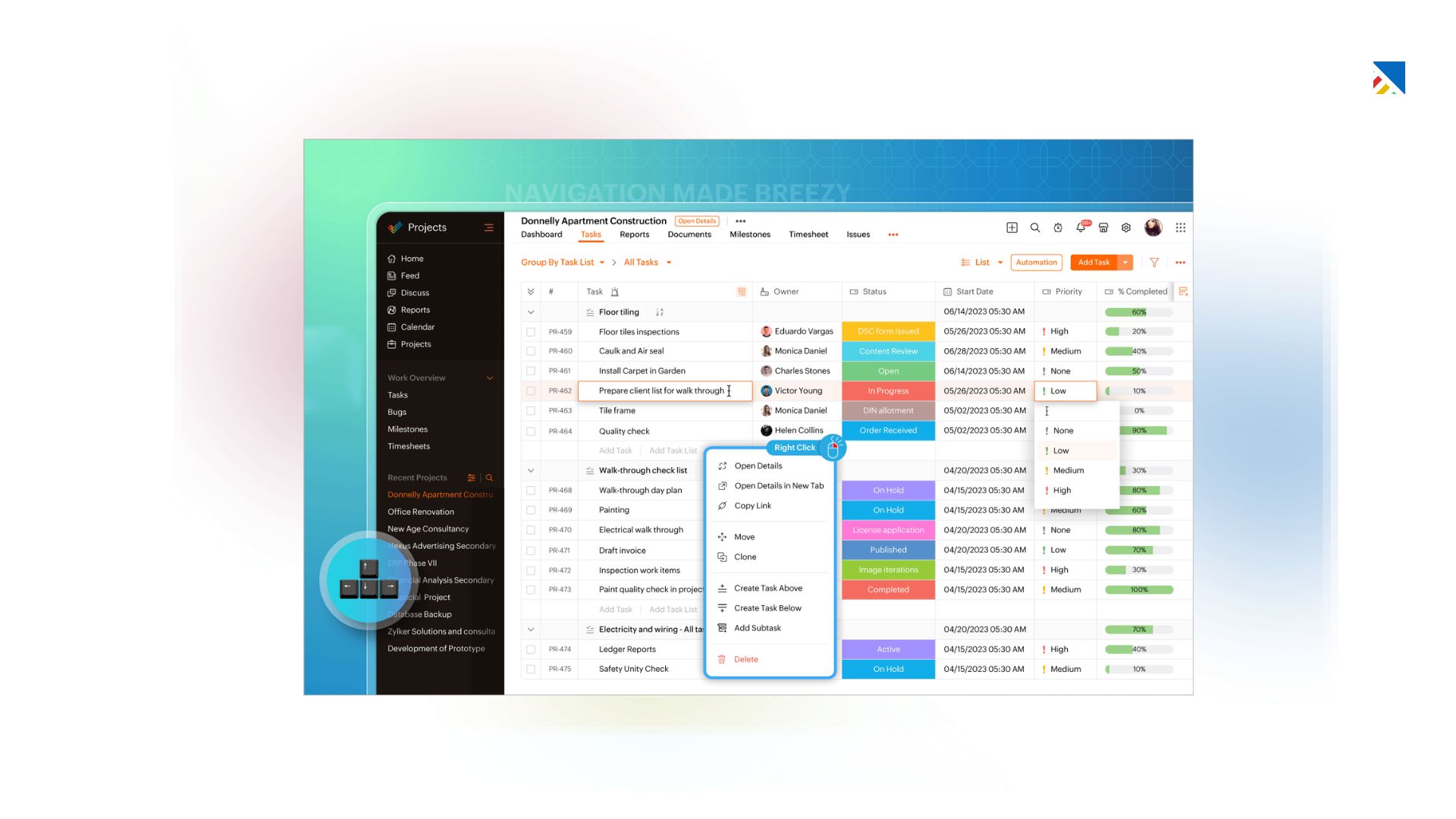
Zoho Projects is a cloud-based project management tool designed to work seamlessly within the Zoho ecosystem. It helps teams plan, track, and execute projects efficiently while staying connected to sales and finance workflows through native integrations.
Key Features:
Native integration with Zoho CRM for streamlined client and deal management
Direct sync with Zoho Books for invoicing and billing automation
Task management with milestones, dependencies, and automation rules
Gantt charts and dashboards for visual project tracking
Built-in time tracking for capturing billable and non-billable hours
Custom reports for monitoring project progress and profitability
Collaboration tools, including file sharing, comments, and discussions
Best For:
Businesses already invested in the Zoho ecosystem and want integrated project management, CRM, and accounting workflows without relying on third-party integrations.
Related Blog: The Ultimate Guide to Healthcare Project Management
Freshbooks
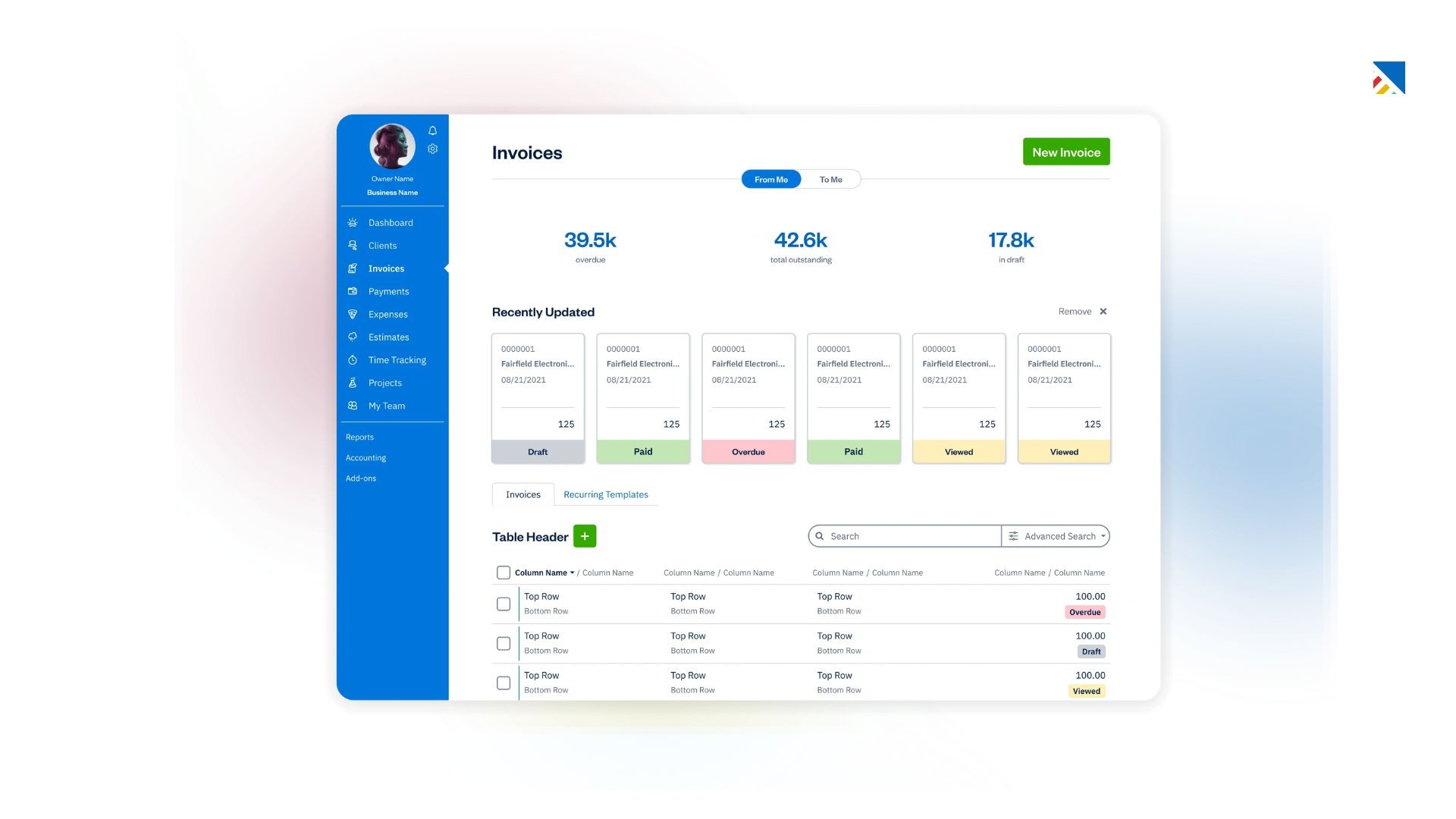
FreshBooks began as an invoicing and accounting platform and has gradually expanded into light project management. It’s designed to help service-based businesses manage billing, track time, and stay organized without the complexity of enterprise-grade project tools.
Key Features:
Highly intuitive invoice builder with customizable templates
Automated expense tracking and receipt management
Built-in time tracking for billable hours
Simple project organization with task lists and basic collaboration
Client portal for sharing files and communicating on projects
Best For:
Freelancers and small service businesses that prioritize easy invoicing and time tracking over complex project planning and advanced resource management.
4. Harvest
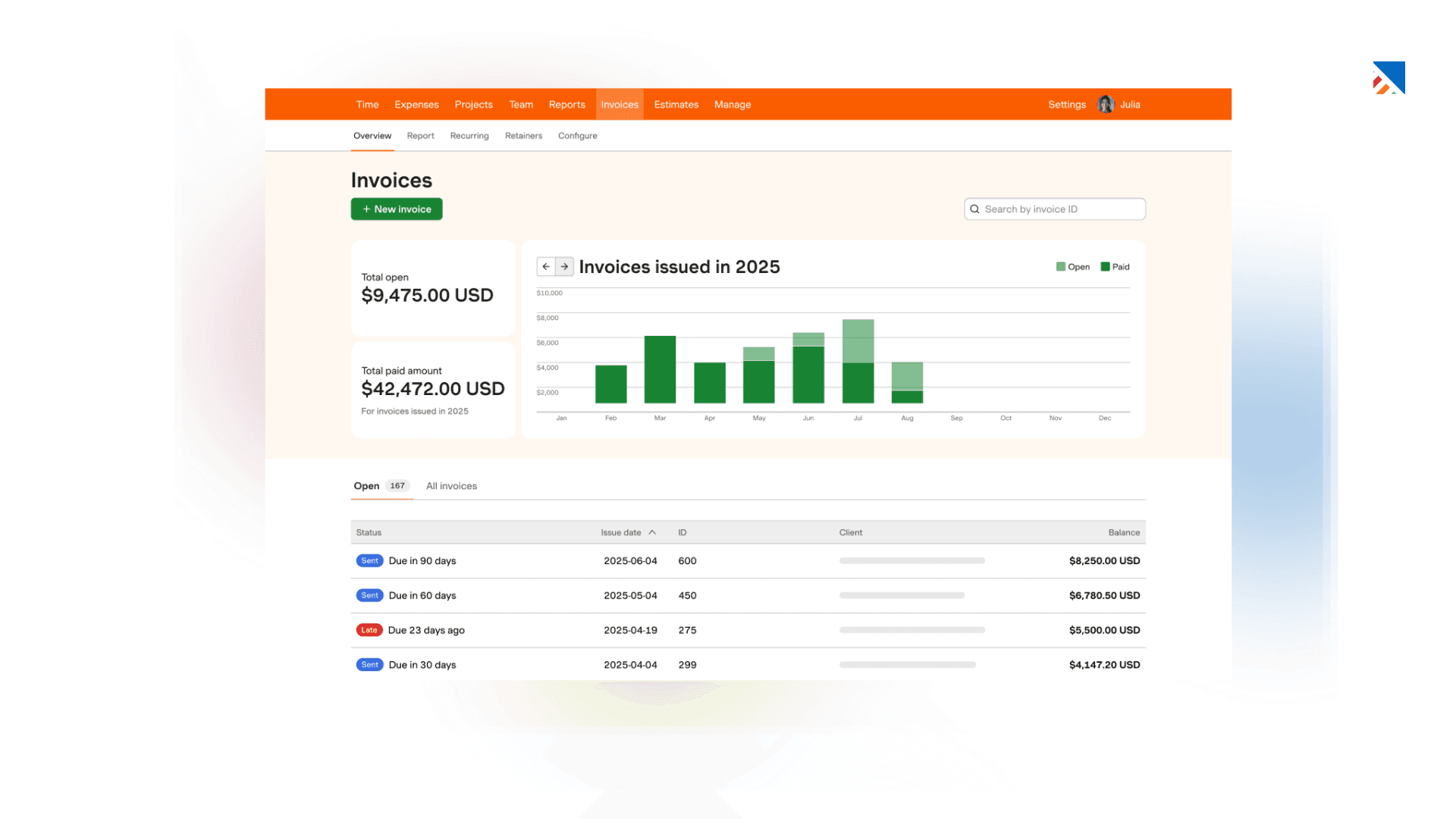
Harvest is a streamlined time-tracking and invoicing tool built for teams that want simplicity and accuracy in billing. Rather than acting as a full project management suite, it focuses on helping businesses track hours, manage costs, and generate invoices with minimal friction.
Key Features:
Simple and intuitive time tracking across projects and tasks
Automatic invoice generation based on logged billable hours
Expense tracking to capture additional project costs
Integration with tools like QuickBooks, Trello, and Asana
Real-time reporting on team capacity and project budgets
Easy export of financial data for accounting workflows
Lightweight setup that fits into existing tech stacks without major disruption
Best For:
Teams that already use a dedicated project management platform and primarily need accurate time tracking and seamless invoicing to support their billing workflows.
5. Teamwork
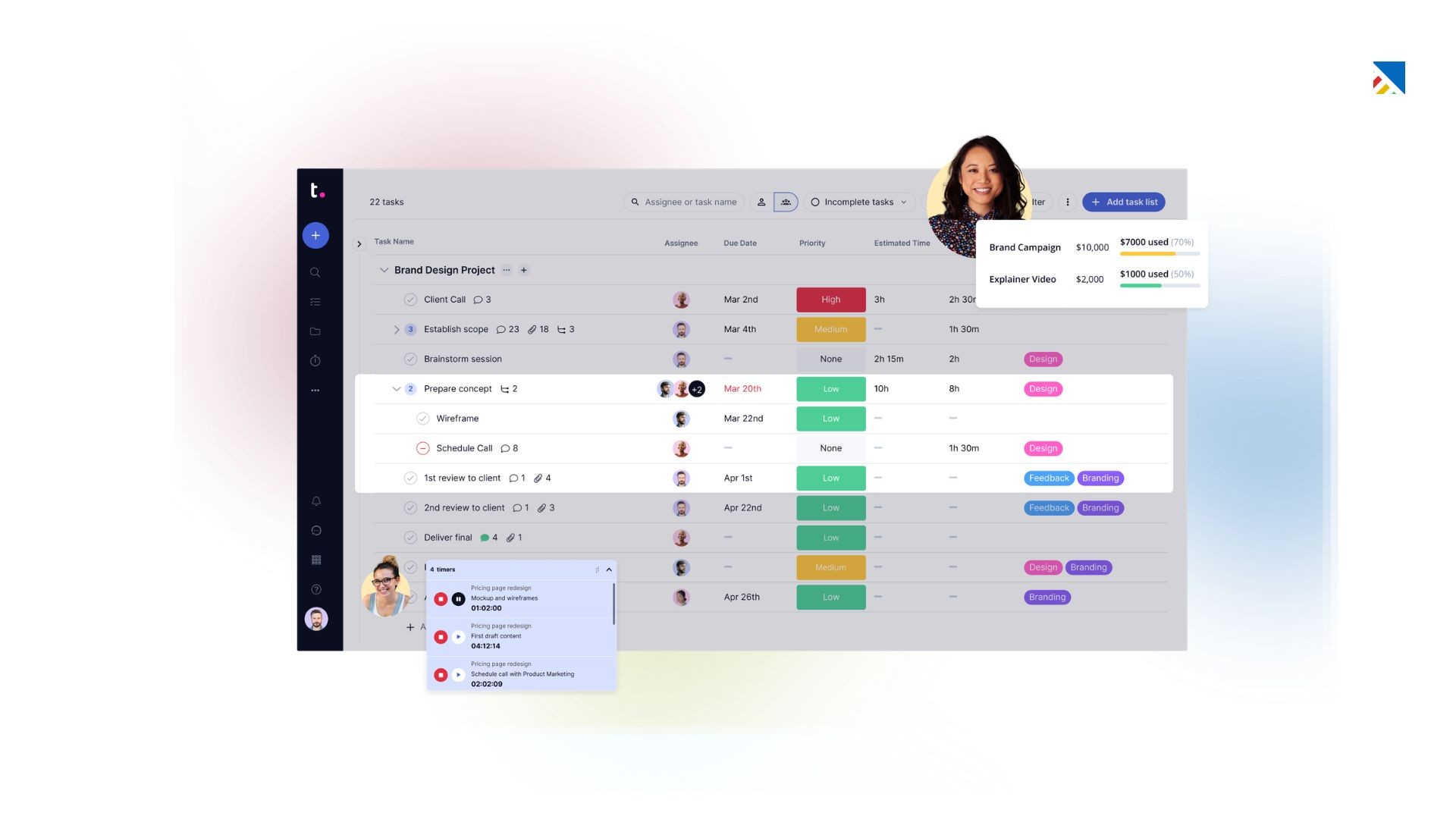
Teamwork is a project management platform built specifically for client-facing teams such as agencies, consultancies, and professional services firms. It combines project tracking, time logging, budgeting, and invoicing with built-in client collaboration features.
Key Features:
Comprehensive project tracking with task lists, milestones, and timelines
Built-in time tracking for billable and non-billable hours
Budget management tools to monitor project profitability
Invoice generation directly from tracked time and expenses
Dedicated client portal for sharing progress updates and collecting feedback
Resource management features to balance team workload
Reporting dashboards for revenue, utilization, and project performance
Best For:
Agencies and client-servicing teams that need robust project management combined with invoicing and a client-facing portal for transparent collaboration.
6. Paymo
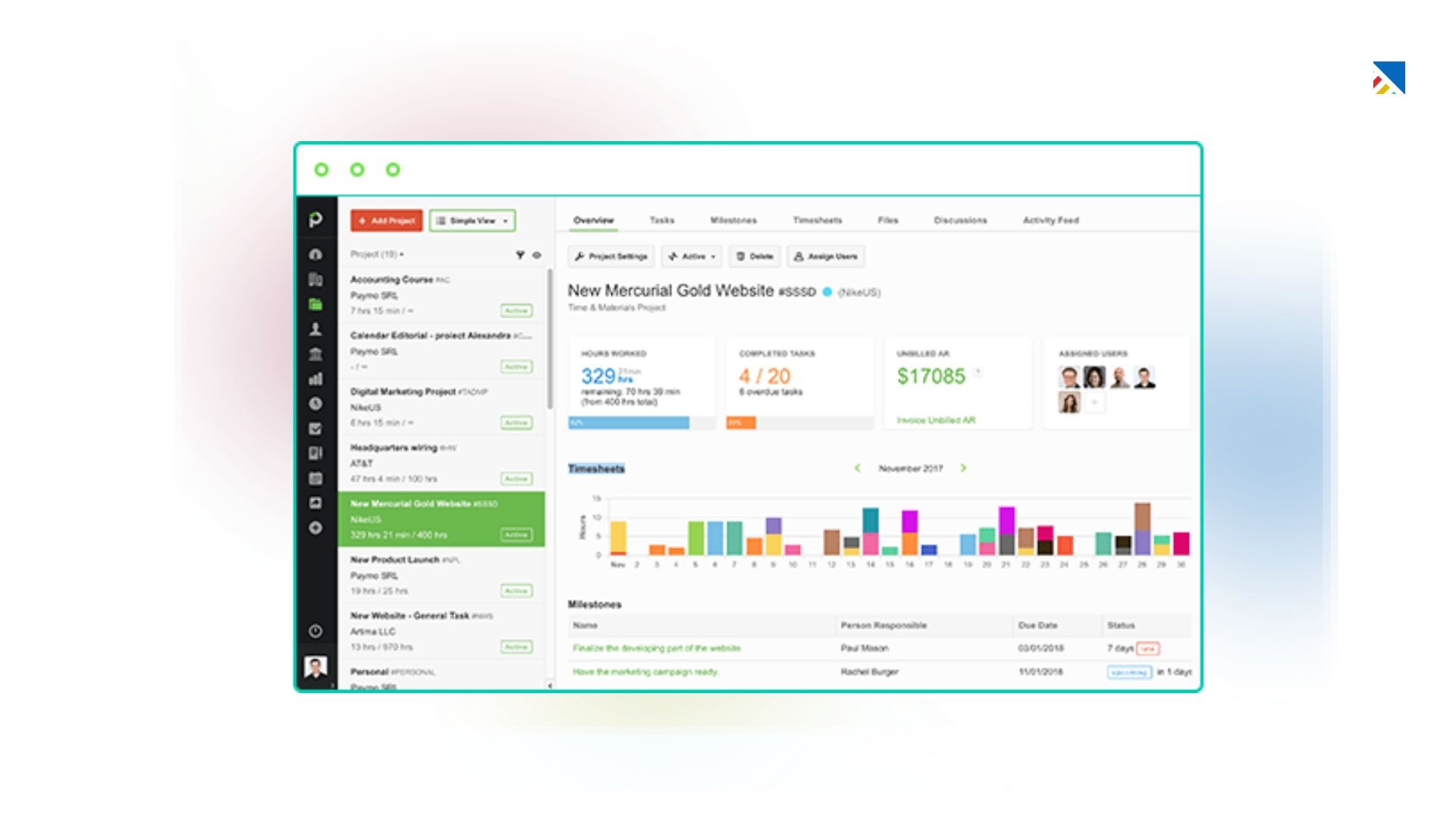
Paymo is an all-in-one platform that combines project management, time tracking, and invoicing in a single workspace. It’s designed for freelancers, consultants, and small to mid-sized teams that want to manage delivery and billing without juggling multiple tools.
Key Features:
Task and project management with lists, boards, and timelines
Built-in time tracking for billable and non-billable hours
Invoice generation directly from tracked time and project data
Budget tracking to monitor project profitability
Integration with Xero for streamlined accounting workflows
Mobile app for tracking time and managing tasks on the go
Team collaboration with comments and file attachments
Reporting tools for time usage, financial performance, and workload visibility
Best For:
Freelancers, consultants, and small teams looking for an affordable, easy-to-use all-in-one solution for managing projects, tracking time, and handling invoicing in one place.
Ready to streamline your project-to-payment process? Contact Our Team.
7. Wrike
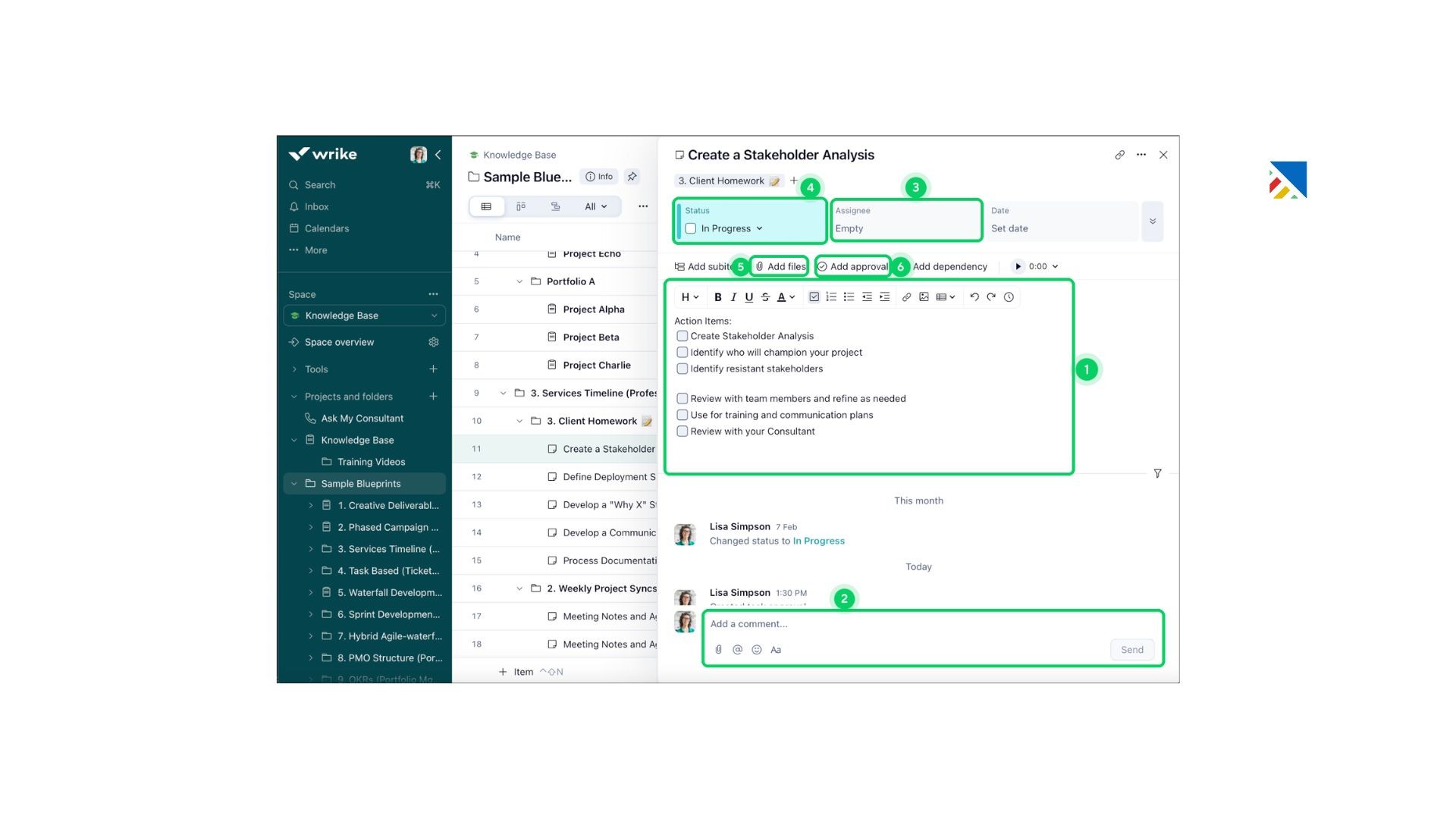
Wrike is a powerful project management platform built for growing teams that need advanced workflows, deep visibility, and cross-department coordination. It goes beyond basic task tracking to support complex, multi-phase initiatives at scale.
Key Features:
Advanced workflow automation with customizable statuses and approvals
Highly customizable dashboards for real-time project visibility
Resource allocation and workload management tools
Built-in time tracking for monitoring effort and productivity
Detailed reporting and analytics for performance tracking
Cross-department collaboration across large teams
Integration-based invoicing and financial workflows
Best For:
Mid-to-large teams managing complex, multi-phase projects that require strong reporting, workflow customization, and advanced resource management.
8. Accelo
Accelo is a comprehensive Professional Services Automation (PSA) platform that brings together project management, billing, time tracking, and client management in one unified system. It’s built to reduce administrative overhead and give service teams more time to focus on delivery.
Key Features:
End-to-end PSA functionality combining projects, tickets, retainers, and contracts
Automated time tracking and invoice generation
Recurring billing and payment reminders to reduce manual follow-ups
Integrated CRM for managing client relationships and sales pipelines
Resource planning and utilization tracking
Real-time dashboards for revenue, margins, and project health
Workflow automation to streamline approvals and task assignments
Centralized client communication history
Best For:
Professional services firms that need a full PSA platform to manage delivery, billing, resource utilization, and client relationships—not just standalone project management.
9. Asana

Asana is a leading work management platform known for its clean, visual interface and strong cross-functional coordination capabilities. It helps teams plan, track, and execute projects efficiently across departments, making complex workflows easier to manage.
Key Features:
Visual task management with list, board, timeline, and calendar views
Task dependencies to manage sequencing and prevent bottlenecks
Cross-team project coordination with shared visibility
Workflow automation for recurring processes and approvals
Custom fields and dashboards for flexible reporting
Integration with invoicing tools like Harvest and FreshBooks
Collaboration tools including comments, file attachments, and status updates
Best For:
Teams that prioritize strong project planning, cross-functional coordination, and workflow visibility, and are comfortable integrating a separate invoicing solution for billing needs.
10. Trello
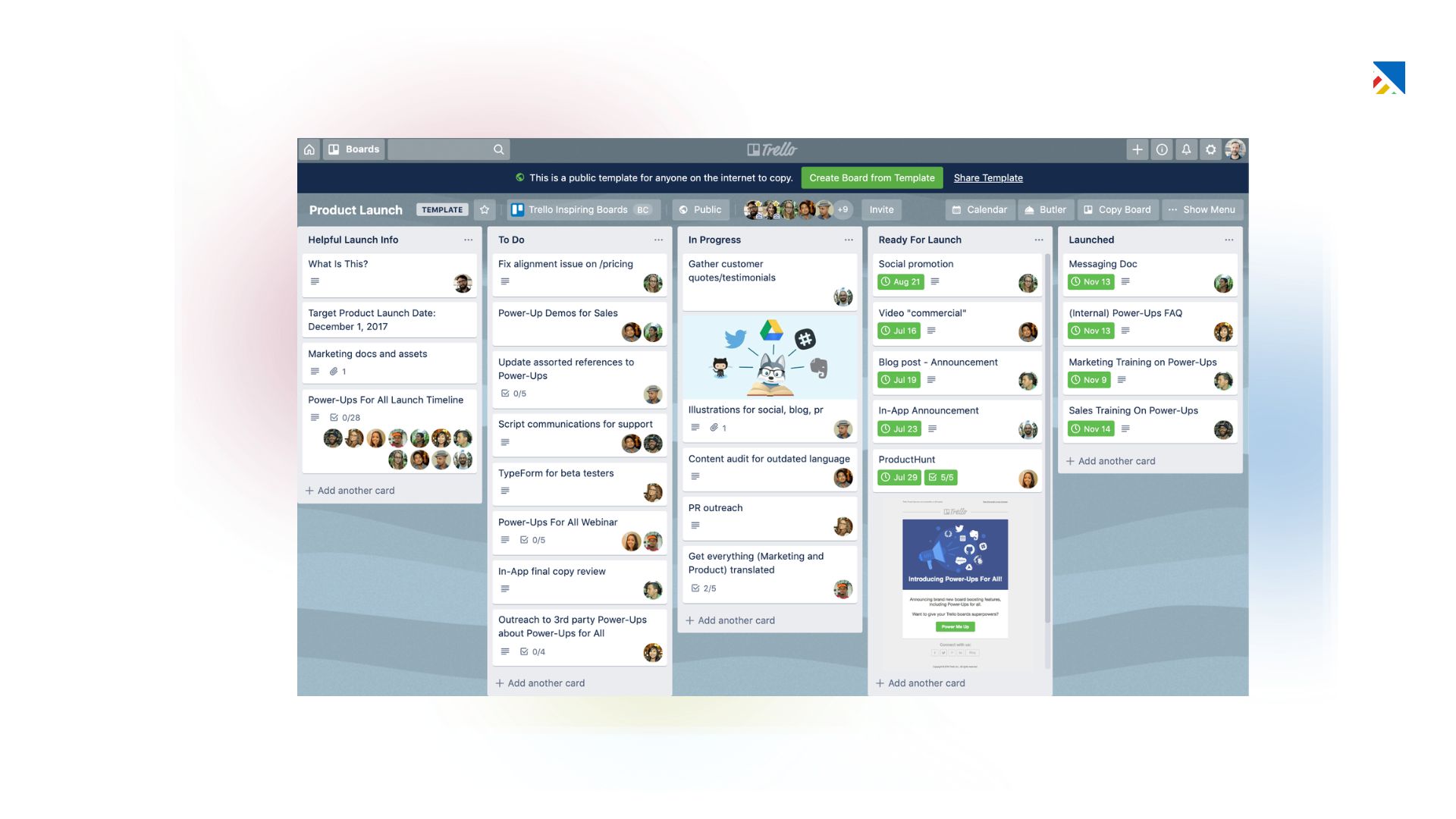
Trello is a lightweight, kanban-style project management tool designed for simplicity and ease of use. Its visual board-and-card system makes it quick to set up and intuitive for teams managing straightforward workflows.
Key Features:
Visual kanban boards with drag-and-drop task cards
Customizable lists and labels for organizing work stages
Checklists, due dates, and attachments within task cards
Power-Ups for integrating time tracking and billing tools
Simple team collaboration with comments and notifications
Quick setup with minimal onboarding required
Best For:
Small teams and simple projects where visual task management and ease of use matter more than advanced project controls or built-in billing features.
What to Look for When Choosing Your Tool
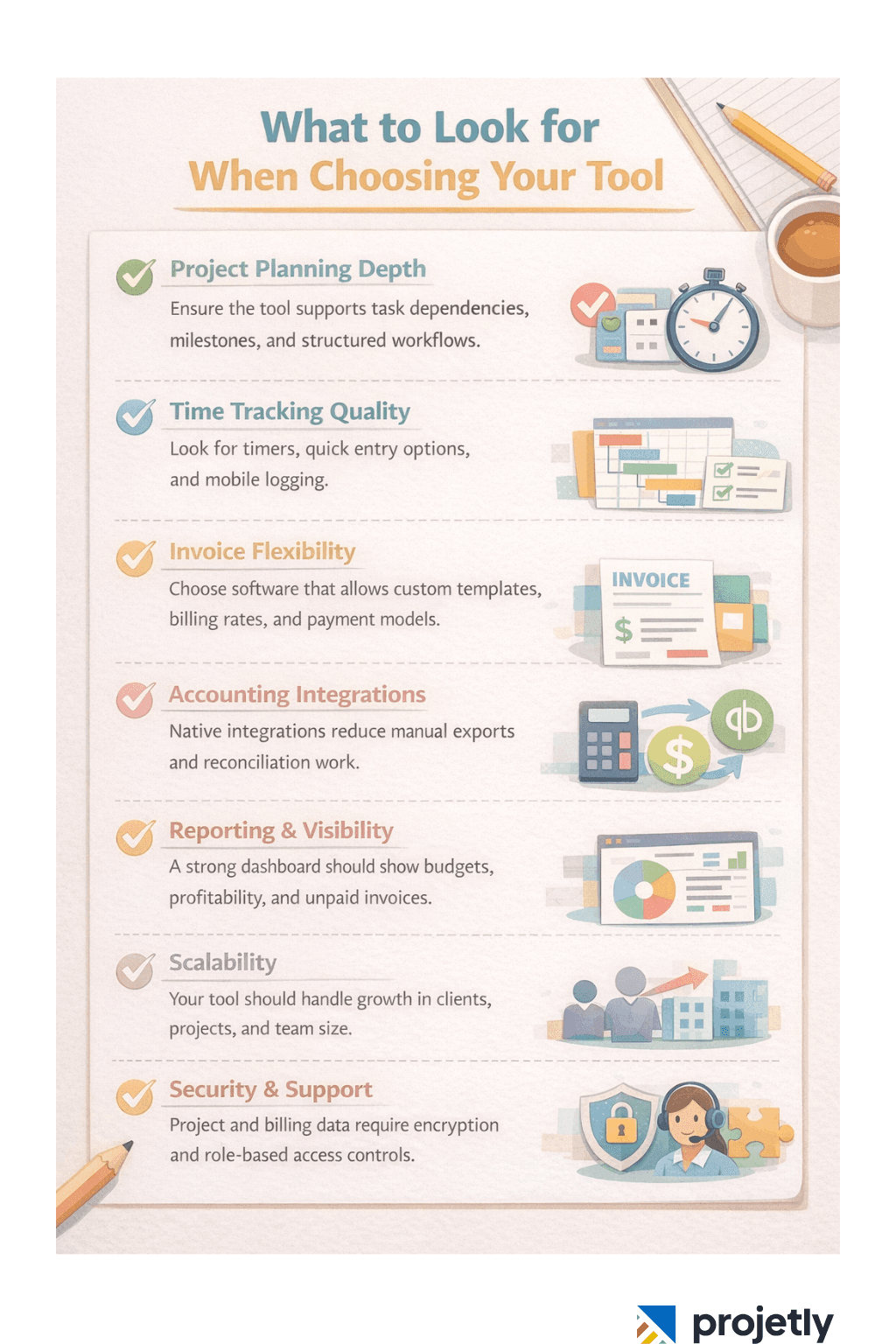
1. Project planning depth: Ensure the tool supports task dependencies, milestones, and structured workflows. This prevents projects from becoming simple to-do lists without real coordination.
2. Time tracking quality: Look for timers, quick entry options, and mobile logging. The easier it is to log time, the more accurate your billing becomes.
3. Invoice flexibility: Choose software that allows custom templates, billing rates, and payment models. Flexible invoicing adapts to retainers, milestones, or hourly projects.
4. Accounting integrations: Native integrations reduce manual exports and reconciliation work. This keeps financial records accurate and aligned with project activity.
5. Reporting and visibility: A strong dashboard should show budgets, profitability, and unpaid invoices. Good visibility helps you make faster, data-driven decisions.
6. Scalability: Your tool should handle growth in clients, projects, and team size. Switching systems later is costly, so plan for expansion early.
7. Security and support: Project and billing data require encryption and role-based access controls. Reliable support ensures issues don’t interrupt operations.
8. Process fit: The software should solve real workflow problems, not add complexity. A good fit reduces friction and improves team adoption.
How do you integrate project management software with invoicing features into your business?
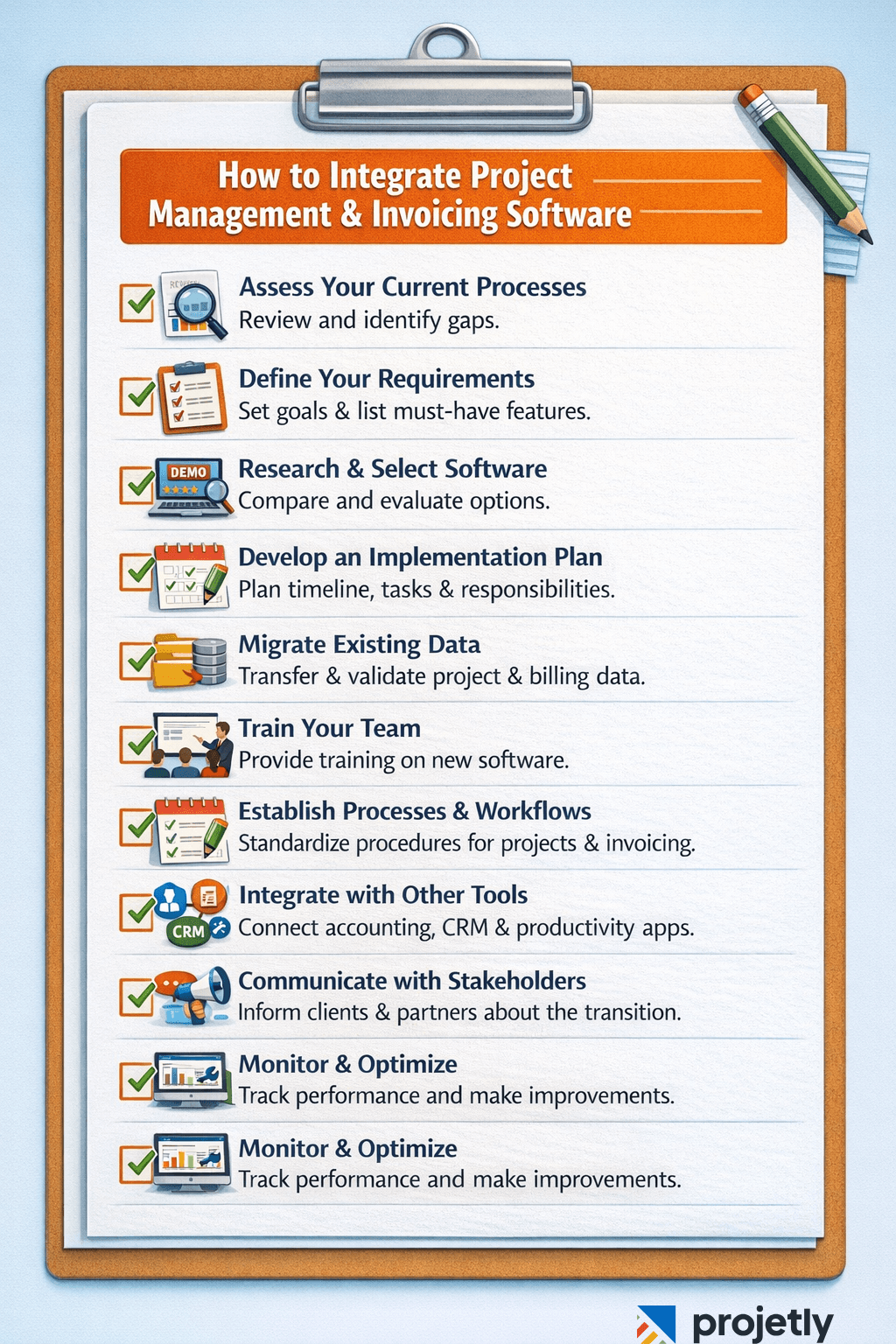
1. Assess Your Current Processes: Review existing project and invoicing workflows. Identify inefficiencies and gaps that the new software should fix.
2. Define Your Requirements: Clarify your goals, team size, and project volume. List must-have features based on client and operational needs.
3. Research and Select the Right Software: Compare tools based on features, pricing, and scalability. Read reviews, request demos, and evaluate integrations.
4. Develop an Implementation Plan: Create a clear rollout timeline with responsibilities. Include data migration, training, and communication steps.
5. Migrate Existing Data: Transfer current project and billing data carefully. Validate accuracy after import to avoid reporting issues.
6. Train Your Team: Provide structured training sessions and resources. Ensure everyone understands new workflows and features.
7. Establish Processes and Workflows: Standardize how projects and invoices will be managed. Define approval steps, billing cycles, and responsibilities.
8. Integrate with Other Tools: Connect accounting, CRM, and productivity tools. Automate data flow to reduce manual entry.
9. Communicate with Stakeholders: Inform clients and partners about the transition. Guide to ensure smooth collaboration.
10. Monitor and Optimize: Track performance and gather feedback. Continuously refine processes to improve efficiency and ROI.
Ready to streamline your projects and invoicing?
Start Your Free Trial
Tips for Getting the Most Out of Your Platform
Once you're up and running, a few habits separate teams that just use their project management software from teams that genuinely leverage it.
Set billing rates at the project level, not just the user level, so retainer and fixed-fee projects invoice correctly without manual adjustments.
Use automated invoice reminders to reduce the time spent chasing payments; most platforms let you schedule follow-up emails after a set number of days.
Review project profitability reports monthly, not just at project close, so you catch scope creep before it erodes margin.
Standardize how your team logs time, same task naming conventions, same daily logging habit, so invoice data is consistent across projects.
Use the vendor's support resources when you hit a wall. Most platforms maintain detailed documentation, and live chat support often resolves issues in minutes rather than days.
Frequently Asked Questions
What is the difference between project management software and invoicing software?
Project management software helps teams plan, assign, and track work. Invoicing software manages billing and payments. When separate, data must be transferred manually, combined platforms automate that flow.
Is it only for large businesses?
No. Tools like FreshBooks, Paymo, and Harvest are built for freelancers and small teams.
Platforms like Wrike and Accelo scale for larger businesses but still offer entry-level plans.
Can these platforms handle milestone-based billing?
Yes, most support milestone and project-based billing alongside hourly billing.
Teamwork, Accelo, and Paymo allow invoices to be triggered by project milestones.
What accounting software do they integrate with?
QuickBooks and Xero are the most common integrations. Some tools, like Zoho Projects, connect directly with their own accounting products.
How long does implementation take?
Simple tools like Harvest or FreshBooks can be set up in 1–2 days. Advanced platforms like Accelo or Wrike may take 2–4 weeks for full setup and training.
You may also like
A Guide to Project Management Professional Certification
Jun 18, 2025
Laugh Your Way to Productivity: 50 Workplace Quotes
Jun 18, 2025
50 Funny Workplace Memes That’ll Brighten Your Workday.
Jun 18, 2025
What Does a Customer-First Mindset Mean? Explained in 2025
Nov 3, 2025
What It Takes to be a Great Customer Success Manager in 2025
Aug 11, 2025
Resolve Common Customer Complaints into Powerful Experiences
Nov 4, 2025








